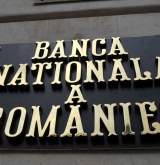Vosganian: Both the leu and 2010 budget in peril due to the political crisis
In order to shield the economy against further blows, “the National Bank must intervene in the market so as to keep a balance in exchange rates under current political pressures”, Varujan Vosganian (photo), former minister of Finance told Wall-Street.
If the economic or political crisis worsens in the following months, Economist Intelligence Unit says the leu could still be much overvalued and vulnerable to devaluation pressures.
The national currency may not be the sole casualty of the political crisis unfolding, but 2010 budget plan too.
“Furthermore, this week is expected the first reading of draft budget for 2010, which has already been delayed due to the political crisis”, Varujan Vosganian stressed.
Romanian government and International Monetary Fund agreed on a budget deficit of 6% for 2010. Gheorghe Pogea, minister of finance said recently the budget was drawn under the assumption of a 5.9% budget gap.
Vladescu: Economic problems are more important than a political dispute
“The problems in the Romanian economy are much too solid to be affected by such a political dispute. And the 2010 budget is drawn by the International Monetary Fund anyway. The government enjoys a restricted freedom of manoeuver in drawing the budget plan, the most important targets and conditions being set out by IMF”, Sebastian Vladescu told Wall-Street.
IMF and Romanian authorities agreed on a budget deficit of 7.3% of GDP this year, following to decrease to below 6% in 2010. IMF predicts an economic contraction of 8-8.5% this year and a modest increase of 0.5-1% in 2010.
Will the stock market react to the political pressures?
Not even at this point, when the crisis has escalated severely, analysts interviewed by Wall-Street don’t expect this coalition crisis to have a major influence on Romanian equity market. In fact, many brokers and analysts said they were not interested on the subject.
“Romanian stock market will not be influenced by this political dispute in any way. In terms of anti-crisis measures, we’re in the same stage as six months ago: nothing has been done”, said Rares Nilas (photo) director of BT Securities.
Political dispute in Romania as seen by Moodyĺs
“Political noise is almost constant in Romania, thus it is already factored into our rating for the government”, Kenneth Orchard, analyst at Moody’s told Wall-Street.
“Such political problems do serve to severely constrain the probability of an upgrade over the medium term, as they inhibit the fiscal and structural reform process. However, we have also seen over the past 10 years that the connection between politics and the broader economy is weak. Economic developments are determined by a wide range of factors; political stability is just one small input”.
Moody’s financial rating agency has affirmed Romania’s ratings and ceilings, outlook remaining stable. Moody’s decision to keep Romania’s status as an investment-grade country was supported by the government’s moderate debt burden and by its gradually deepening institutional strength derived from the EU accession.
























































![HR [PLAY] Tech Workout - 11...](https://www.wall-street.ro/image_thumbs/thumbs/973/973fe0a3888d417feff63de42e814180-260x260-00-65.jpg?v=1714192822)










